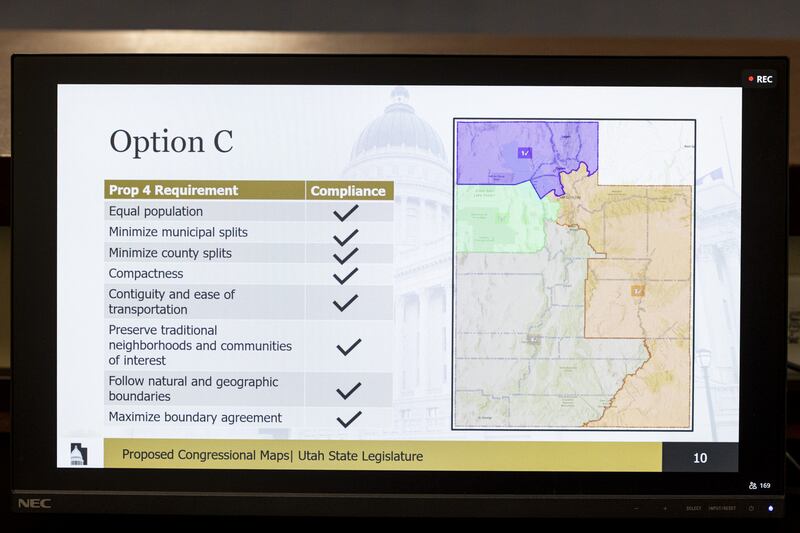Plaintiffs who have sued state lawmakers in favor of Proposition 4 are now asking a judge to block a Republican-led effort to repeal the redistricting law.
Those plaintiffs won a victory in August when 3rd District Judge Dianna Gibson said lawmakers acted unlawfully when they altered the 2018 ballot initiative. Now, Mormon Women for Ethical Government, the League of Women Voters of Utah and several individuals claim the effort to fully repeal Proposition 4 through an indirect initiative is tantamount to the changes made that were already found unconstitutional.
Unlike a traditional ballot initiative — which must receive signatures from 8% of the voters to qualify for the ballot and pass through a popular statewide vote — indirect initiatives only need to receive signatures from 4% of voters before passing through the Legislature. In this case, proponents of the initiative would need to collect about 70,000 votes and meet a similar threshold in 26 of the state’s 29 Senate districts before submitting it to the GOP-controlled Legislature.
“The statutorily-created indirect initiative process does not provide a mechanism for the Legislature to infringe the people’s constitutional right to alter or reform their government via an initiative passed by a majority of voters,” reads the new complaint, filed Wednesday as part of the ongoing legal dispute over political boundaries in Utah.
“A legislative repeal of such an initiative does not transform from unconstitutional to constitutional merely because it is supported by the signatures of 4% of voters through a process devised by the Legislature and not the Constitution.”
The complaint alleges that supporters of an indirect initiative “cannot submit to the Legislature an unconstitutional law.”
Rob Axson, the state GOP chairman and one of six sponsors of the initiative to repeal Proposition 4 and an accompanying referendum to undo the new maps adopted by lawmakers last week, blasted the court filing, calling it the “height of arrogance and hypocrisy for those who once used the courts and the initiative process to push their agenda to now try to deny others that same right.”
“Having climbed the ladder allowed in the process and the courts, they now beg for continued unilateral action from one judge to pull the ladder up behind them,” he told KSL.com. “You cannot celebrate the rule of law when it serves you and undermine it when others use those same tools.
“The courts and the people’s initiative process belong to all Utahns — and are laid out in the law. If their ideas truly stand on principle, they should welcome debate, not hide behind legal gamesmanship to deny Utahns who disagree with them from being heard.”
Top legislative leaders also took issue with the lawsuit, and said it’s why they have been opposed to courts being involved in the redistricting process from the beginning.
“This is exactly what happens when courts step beyond their role and make policy from the bench,” House Speaker Mike Schultz, R-Hooper, and Senate President Stuart Adams, R-Layton, said in a joint statement. “Instead of respecting the separation of powers, the court has thrown Utah’s constitutional process into confusion and chaos, leaving Utahns to navigate the fallout in uncharted territory. Our Founding Fathers put together a republic, not a pure democracy.”
The plaintiffs filed the new complaint in the same case against the Legislature, several legislative leaders and Lt. Gov. Deidre Henderson, although the only cause of action in the latest filing is against Henderson in her official capacity. They allege that the initiative to repeal Proposition 4 would violate Utah voters’ rights to alter or reform their government and asked the courts to issue a preliminary injunction blocking Henderson from printing the signature packets.
Attorneys for the state had not replied in court filings as of Thursday afternoon, nor had the judge. The complaint is only the most recent in the legal wrangling over map-drawing. It follows a move by the same plaintiffs to sue over the new map lawmakers voted on last week, after the judge tossed the maps that were in place during the last two election cycles.
The judge is set to hear arguments on the remedial map next week and is expected to rule on a map before Nov. 10.


